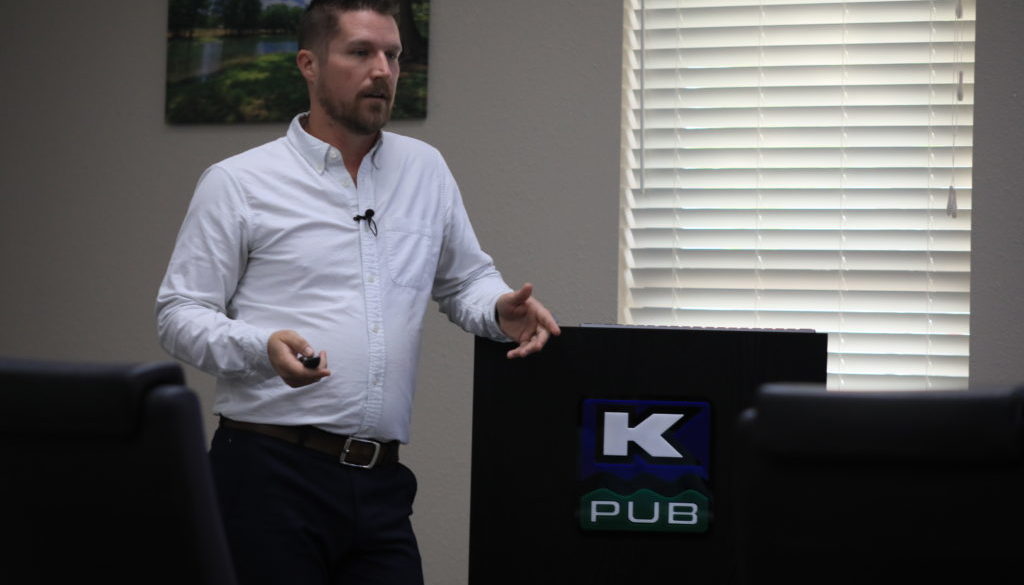To help locals cut back on their energy bill, Kerrville Public Utility Board hosted a “Spring Power Hour” event to teach customers the common myths surrounding energy consumption and provide a few tips for boosting efficiency.
“If you break down your electric usage, there are typically four main areas that can improve energy efficiency: lighting, appliances, smart technology – and the biggest one – heating and cooling,” said KPUB Key Accounts & Energy Education Specialist DJ Owens.
KPUB assesses homes during energy audits to identify issues that can lead to unnecessary energy consumption. Breaking down the average KPUB customer’s energy usage, Owens demonstrates what aspects of your energy bill tend to cost the most and when.
“With the average breakdown, HVAC takes up 52 percent of the bill. We do have what’s called shoulder months – the spring and fall – when it’s not super-hot outside and it’s not super-cold. Your HVAC unit is not going to be working as hard as in January or August when we have those really severe temperatures, but across the board it’s still one of the biggest aspects,” said Owens.
With most energy usage in Kerrville stemming from HVAC use, Owens focused on a variety of ways to increase efficiency when dealing with extreme Texas temperatures.
“The average lifespan of HVAC units can be 10, 15, 20 years. It just depends on the usage. I’ve even seen HVAC units get replaced at 30 years old around here. On the other hand, I’ve seen HVAC units get replaced at only seven years old. It just depends on the comfort level of each customer,” said Owens
To increase comfortability in a home, KPUB customers can request a free residential energy audit where their professionals can inspect and determine ways to improve energy usage.
“When we go into a house for an audit, the first thing that we do is go up to the attic to look at the duct work, make sure everything’s sealed up. If you have open duct work in your attic, that cool air comes out of your air handler and goes into the attic. I’ve seen houses where the attic is cooler than the house,” said Owens.
Keeping the insulation in a home in good shape is a significant and often simple fix for lowering energy usage.
“Insulation is one of the cheaper upgrades that you do for comfort in your house. Windows can be pretty expensive. A whole HVAC system can be pretty expensive. But insulation–it’ll help you be comfortable and there’s a lot of different types of insulation that you can work with,” said Owens.
As for some of the energy myths Owens busted, many revolved around what sort of appliances are best to use and how to operate them efficiently.
“One myth is turning thermostat way down or up cools or heats it faster. You don’t want to go down a lot of degrees at once because your AC unit will have to work really hard to try and catch up with the difference. What you want to do is adjust it every two to three degrees in the direction you want it to go, let it cycle, then once you hear it kick off, you can go and turn it down a couple more degrees,” explained Owens.
Another culprit of a high energy bill could be a homes’ refrigerator or freezers.
“The first myth with refrigeration is that keeping your fridge colder makes food last longer. Not all food needs to stay at the same temperatures. That’s why there’s separate drawers in fridges. The lower you have that setting on your fridge, the harder that thing’s gonna have to work,” said Owens.
The temperature a refrigerator is set to isn’t the only way to save on energy consumption–keeping a stocked fridge can also make cooling easier on the appliance.
“I’ve been on audits where there are customers with multiple refrigerators. One might be empty, and the other one’s full, but the more stuff you have in your refrigerator–the better insulated it is. So if you have an empty garage refrigerator and it’s plugged in, that thing’s just wasting energy,” said Owens.
KPUB hosts multiple educational sessions throughout the year for customers as well as the community at whole. The next event held is a Community Energy Savings & Bingo event, slated for May 9 at the Doyle Center.
For more information about KPUB’s educational sessions, visit their website at kpub.com/turn.
